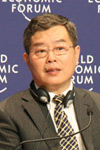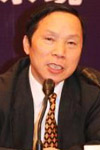|
Thanks to the economic stimulus package the Chinese government implemented in October 2008, the country's economy is on track to meet its target of 8-percent economic growth for the year. What new challenges will Chinese economic and social development face? There are still debates in the market over which macroeconomic policies the government should pursue next.
At a seminar on sustainable economic development in the post-crisis era held in Beijing on November 5, participants delivered their views on the future economic situation and possible macro policies.
Li Yang: Optimize investment structure
 |
|
Li Yang (EASYMONEY.COM) |
Li Yang, Vice President of the Chinese Academy of Social Sciences (CASS), said that readjustment of the economic structure is an important long-term issue for the Chinese economy. That readjustment must start with optimizing the investment structure.
According to Li, in the middle term it will still be hard to greatly increase consumption and exports. The underlying reason for low consumption is the slow growth of individual income, which needs to change the primary distribution of income in the domestic economy. However, this is by no means easy. Since the global economy is not picking up markedly, exports are unlikely to continue their high growth of previous years. Economic growth will therefore depend on investment. Readjustment of the economic structure must start with optimizing the investment structure.
The first step is to make the creation of job opportunities the top priority. At present, most investment is in the infrastructure construction sector, which creates fewer jobs than other sectors. Many economic statistics are picking up now, but employment figures are not yet optimistic. To really create job opportunities, the government should invest more in small and medium-sized enterprises.
Second, investment must be beneficial to the readjustment of industrial and regional structures. The government should take into consideration different development levels in different regions of China. For example, in some regions, the overall industrialization process has been completed, while other regions are still in the initial stage of industrialization. The government should also enrich its regional development strategies such as the rise of central China, development of west China and revitalization of northeast China.
Third, the structure of investors should be improved. Investors should include not only the government, but also private companies.
Fourth, the financing structure should be readjusted. The government should support all measures that aid the development of direct financing. It should also support all measures that aid the transfer of credit into stock ownership.
Chen Dongqi: Four aspects of future macro control
 |
|
Chen Dongqi (CEIS.GOV.CN) |
Chen Dongqi, Deputy Director of the Academy of Macroeconomic Research at the National Development and Reform Commission (NDRC), predicted that following the high rate of growth this year, Chinese economic growth will accelerate in 2010.
As for future macro policy, Chen discussed four areas of concern.
First, the government should concentrate its efforts on balancing stable and rapid economic development with reasonable inflation. It should make more efforts to improve the quality of economic growth and benefits of microeconomic growth, pay attention in order to cope with the possible losses in economic growth brought about by amplified external risks, and look out for accelerated inflation that may affect economic growth.
Second, the government should concentrate its efforts on coping with the challenge of increased external costs. Because global economic growth is expected to accelerate, the prices of raw materials in the global market may rise faster than expected. The high price of oil is an example. This will push up the costs of economic growth. Furthermore, growing protectionism in the world, the development of a low-carbon economy to cope with climate change, and the rising prices of real estate in China will all push up the financial expenses and production costs of Chinese companies. The government should carry out structural reform in advance to offset such cost increases.
Third, the government should concentrate its efforts on coping with the challenges to the sustainability and effectiveness of our monetary policy brought about by accelerated changes in the monetary policies of developed countries. Special attention should be paid in coping with challenges to the reasonability and balance of our monetary policy. In 2010, developed economies will accelerate adjustment of not only their money supplies, but also their interest rates. At present, only Norway, Israel and Australia have raised their interest rates, but next year, major economies are likely to do the same thing, which will make it more difficult for China to adjust its monetary policy.
| 